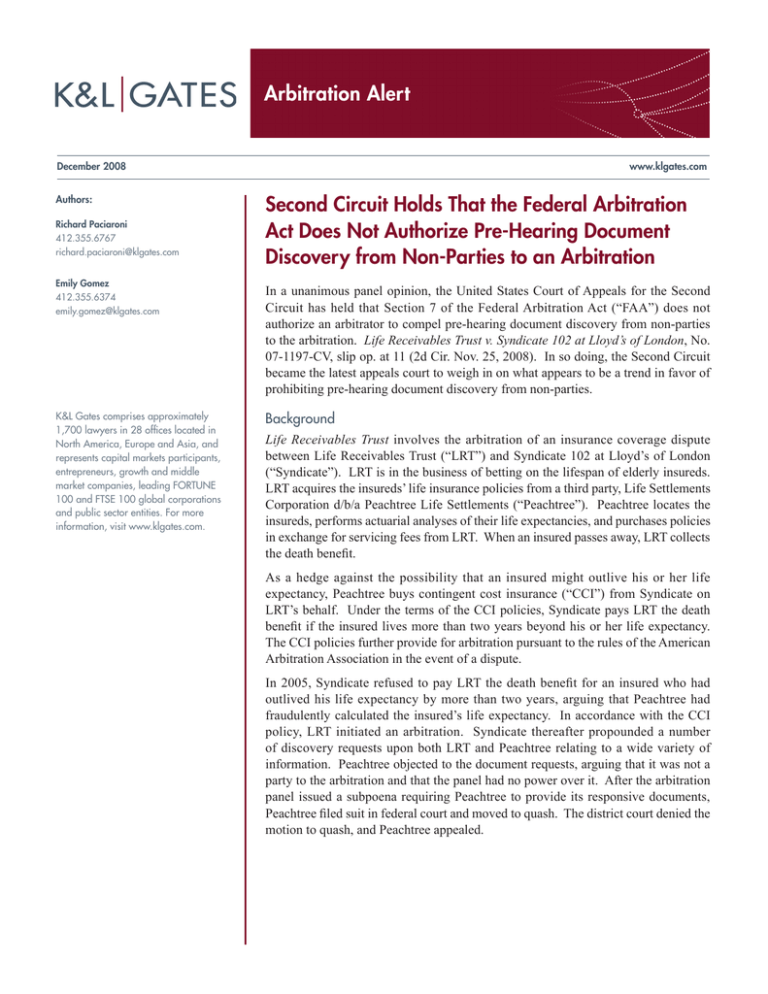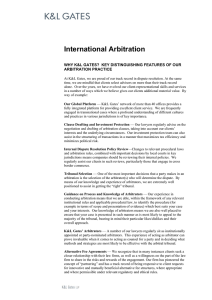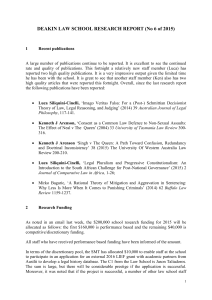
Arbitration Alert
December 2008
Authors:
Richard Paciaroni
412.355.6767
richard.paciaroni@klgates.com
Emily Gomez
412.355.6374
emily.gomez@klgates.com
K&L Gates comprises approximately
1,700 lawyers in 28 offices located in
North America, Europe and Asia, and
represents capital markets participants,
entrepreneurs, growth and middle
market companies, leading FORTUNE
100 and FTSE 100 global corporations
and public sector entities. For more
information, visit www.klgates.com.
www.klgates.com
Second Circuit Holds That the Federal Arbitration
Act Does Not Authorize Pre-Hearing Document
Discovery from Non-Parties to an Arbitration
In a unanimous panel opinion, the United States Court of Appeals for the Second
Circuit has held that Section 7 of the Federal Arbitration Act (“FAA”) does not
authorize an arbitrator to compel pre-hearing document discovery from non-parties
to the arbitration. Life Receivables Trust v. Syndicate 102 at Lloyd’s of London, No.
07-1197-CV, slip op. at 11 (2d Cir. Nov. 25, 2008). In so doing, the Second Circuit
became the latest appeals court to weigh in on what appears to be a trend in favor of
prohibiting pre-hearing document discovery from non-parties.
Background
Life Receivables Trust involves the arbitration of an insurance coverage dispute
between Life Receivables Trust (“LRT”) and Syndicate 102 at Lloyd’s of London
(“Syndicate”). LRT is in the business of betting on the lifespan of elderly insureds.
LRT acquires the insureds’ life insurance policies from a third party, Life Settlements
Corporation d/b/a Peachtree Life Settlements (“Peachtree”). Peachtree locates the
insureds, performs actuarial analyses of their life expectancies, and purchases policies
in exchange for servicing fees from LRT. When an insured passes away, LRT collects
the death benefit.
As a hedge against the possibility that an insured might outlive his or her life
expectancy, Peachtree buys contingent cost insurance (“CCI”) from Syndicate on
LRT’s behalf. Under the terms of the CCI policies, Syndicate pays LRT the death
benefit if the insured lives more than two years beyond his or her life expectancy.
The CCI policies further provide for arbitration pursuant to the rules of the American
Arbitration Association in the event of a dispute.
In 2005, Syndicate refused to pay LRT the death benefit for an insured who had
outlived his life expectancy by more than two years, arguing that Peachtree had
fraudulently calculated the insured’s life expectancy. In accordance with the CCI
policy, LRT initiated an arbitration. Syndicate thereafter propounded a number
of discovery requests upon both LRT and Peachtree relating to a wide variety of
information. Peachtree objected to the document requests, arguing that it was not a
party to the arbitration and that the panel had no power over it. After the arbitration
panel issued a subpoena requiring Peachtree to provide its responsive documents,
Peachtree filed suit in federal court and moved to quash. The district court denied the
motion to quash, and Peachtree appealed.
Arbitration Alert
The Second Circuit’s Decision
On appeal, the Second Circuit overturned the district
court’s ruling. The court began by considering the
language of Section 7 of the FAA, the only provision
that addresses document production in arbitration.
Section 7, inter alia, grants arbitrators the power to:
“…summon in writing any person to attend
before them or any of them as a witness and in a
proper case to bring with him or them any book,
record, document, or paper which may be deemed
material as evidence in the case.”
Next, the court examined the current circuit split
over whether Section 7 may be used as authority
to compel depositions and pre-hearing document
discovery outside the presence of arbitrators.1 On
the one hand, the Eighth Circuit has held that Section
7 implicitly grants an arbitration panel the power to
subpoena relevant documents from non-parties prior
to a hearing.2 The Eighth Circuit’s rationale is that
without the power to produce these documents ahead
of time, the parties would be unable to review and
analyze relevant information prior to the hearing.
On the other hand, the Third Circuit has held that the
explicit language of Section 7 restricts an arbitrator’s
subpoena power over non-parties to situations in
which the non-party appears in the arbitrator’s
physical presence.3 The Third Circuit’s rationale
is that regardless of inconvenience or inefficiency,
a court cannot grant powers to arbitrators that the
legislature has not seen fit to convey. Somewhere
in the middle is the Fourth Circuit, which has found
a special exception in Section 7 that permits prehearing document discovery of third parties upon a
showing of special need or hardship.4
1 Life Receivables Trust v. Syndicate 102 at Lloyd’s
of London, No. 07-1197-CV, slip op. at 7-8 (2d Cir.
Nov. 25, 2008).
2 In re Arbitration Between Sec. Life Ins. Co. of Am.,
228 F.3d 865, 870-71 (8th Cir. 2000).
3 Hay Group, Inc. v. E.B.S. Acquisition Corp., 360
F.3d 404, 407 (3d Cir. 2004).
4 Comsat Corp. v. Nat’l Sci. Found., 190 F.3d 269,
275 (4th Cir. 1999).
The Second Circuit sided firmly with the Third
Circuit’s analysis, holding that documents are only
discoverable from non-parties to an arbitration when
brought before arbitrators by a testifying witness.5
The clear and unambiguous language of Section 7,
combined with the fact that a previous, similarlyworded version of Federal Rule of Civil Procedure
45 did not permit federal courts to issue pre-hearing
subpoenas on non-parties, persuaded the court that
Section 7 of the FAA also does not authorize prehearing document discovery on non-parties to an
arbitration. The court did not specifically address
whether Section 7 would authorize pre-hearing
depositions of non-parties, but its strict interpretation
of the statutory language seems to preclude any
third-party discovery outside of a hearing before
the arbitrators.
Other Options for Document Discovery from
Non-Parties
The Second Circuit took pains to note that its
interpretation of Section 7 does not leave arbitrators
completely unable to order the production of
documents from third parties. Despite the inability
to order pre-hearing document discovery, arbitrators
remain empowered to order “any person” to produce
documents as long as that person is called as a witness
at a hearing.6 While this process is certainly less
efficient, the inconvenience of having to appear may
cause a testifying witness to deliver the documents
and waive his or her presence.7 Alternatively, an
arbitrator also retains the power to compel a nonparty witness to appear with documents and then
adjourn the proceedings, giving the parties time to
review the evidence.8
Parties who want to further ensure that arbitrators
will have the power to order third-party discovery
in their contract disputes can also take the step of
expressing a preference for state arbitration law
in all of their contracts. If an underlying contract
specifically incorporates the arbitration law of a state
5
6
7
8
Life Receivables Trust, slip op. at 10.
Id. at 13.
Id. at 14.
Id.
December 2008 | 2
Arbitration Alert
that grants arbitrators the ability to order discovery
from non-parties, the arbitrators’ powers under state
law will not be pre-empted by the more restrictive
FAA. See generally Volt Info. Scis., Inc. v. Bd.
of Trs. of Leland Stanford Junior Univ., 489 U.S.
468, 477 (1989); see also Mastrobuono v. Shearson
Lehman Hutton, Inc., 514 U.S. 52 (1995).
Conclusions
Life Receivables Trust gives non-arbitral parties
much greater ability to resist document production
than they have had previously. In conjunction
with the Third Circuit’s 2004 Hay Group decision,
the case seems to signal a trend towards greater
limitations on an arbitrator’s ability to order the
production of documents from non-parties to an
arbitration. Parties that require documents in the
possession of non-parties would be well advised to
cultivate amicable relations and ask them to produce
documents voluntarily, in lieu of having the nonparties physically appear and produce documents
in the arbitration proceeding.
K&L Gates comprises multiple affiliated partnerships: a limited liability partnership with the full name K&L Gates LLP qualified in Delaware and maintaining
offices throughout the U.S., in Berlin, in Beijing (K&L Gates LLP Beijing Representative Office), and in Shanghai (K&L Gates LLP Shanghai Representative
Office); a limited liability partnership (also named K&L Gates LLP) incorporated in England and maintaining our London and Paris offices; a Taiwan
general partnership (K&L Gates) which practices from our Taipei office; and a Hong Kong general partnership (K&L Gates, Solicitors) which practices
from our Hong Kong office. K&L Gates maintains appropriate registrations in the jurisdictions in which its offices are located. A list of the partners in each
entity is available for inspection at any K&L Gates office.
This publication is for informational purposes and does not contain or convey legal advice. The information herein should not be used or relied upon in
regard to any particular facts or circumstances without first consulting a lawyer.
©1996-2008 K&L Gates LLP. All Rights Reserved.
December 2008 | 3






